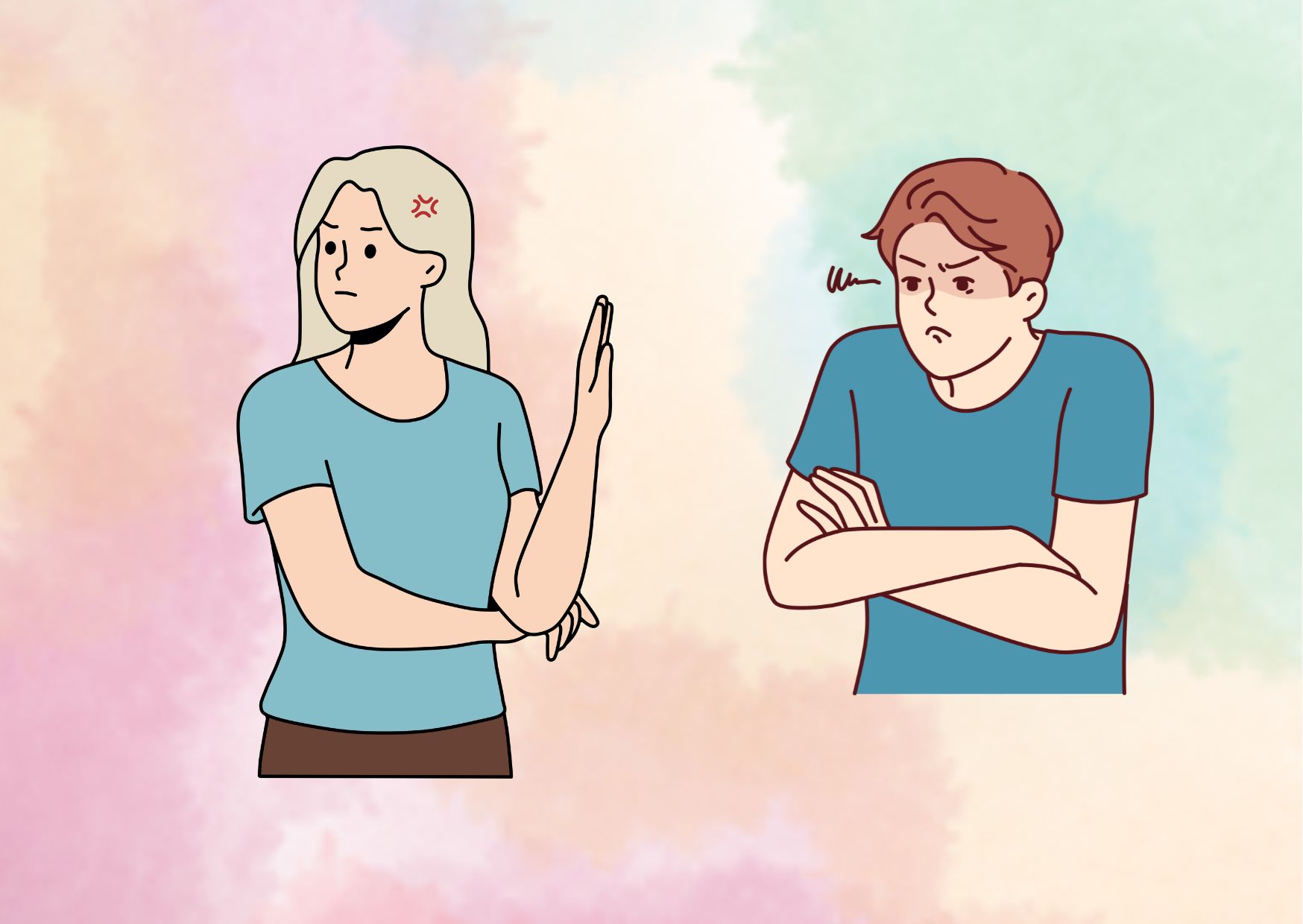It’s crucial to recognize that these reactions are typical of narcissistic behavior and do not reflect a genuine change in the narcissist’s character or a sudden development of empathy. Instead, they represent attempts to regain control and attention, often without regard for the emotional well-being of the other person. Understanding these common reactions can help individuals stay prepared and maintain their boundaries when ignoring a narcissist. It’s often helpful to seek support from trusted friends, family members, or mental health professionals during this challenging process.
Strategies for Effectively Ignoring a Narcissist
Ignoring a narcissist can be a challenging but necessary step towards protecting one’s mental and emotional well-being. Effective strategies involve setting clear boundaries and implementing the no contact rule. These approaches help individuals regain control of their lives and break free from the cycle of narcissistic abuse.
Setting Clear Boundaries
Setting boundaries with a narcissist is crucial for maintaining a healthy relationship or, in some cases, ending a toxic one. Here are some strategies to establish and maintain clear boundaries:
- Be specific and direct: Clearly articulate boundaries in a straightforward manner. Avoid vague language and be direct about unacceptable behaviors.
- Use “I” statements: Frame boundaries using “I” statements to avoid sounding accusatory. For example, say, “I need you to not talk to me this way” instead of “You always speak disrespectfully.”
- Stay calm and assertive: Maintain a composed demeanor when communicating boundaries. Narcissists may try to provoke emotional reactions, so remaining calm is essential.
- Set consequences: Clearly communicate the consequences of boundary violations and be prepared to follow through. This reinforces the importance of respecting boundaries.
- Limit personal information: Be cautious about sharing personal information with a narcissist, as they may use it against you or manipulate situations to their advantage.
- Avoid JADE (Justify, Argue, Defend, Explain): Narcissists may try to engage in arguments or manipulate you into justifying your boundaries. State them clearly and calmly, then disengage if the narcissist persists.
- Set internal emotional boundaries: Establish limits on emotional investment and recognize when the narcissist is attempting to manipulate your emotions.
- Learn to say “no”: Practice saying “no” without feeling guilty. Narcissists may pressure or guilt-trip you into complying with their demands, so asserting yourself is important.
Implementing the No Contact Rule
The no contact rule is a powerful strategy to cut ties with a narcissist and protect oneself from further emotional manipulation. Here’s how to implement it effectively:
- Cut all communication: Stop all forms of interaction with the narcissist, including phone calls, text messages, emails, and social media contact.
- Block and delete: Remove the narcissist’s contact information and block them on all communication platforms to prevent temptation or unexpected contact.
- Maintain resolve: The narcissist may attempt to regain contact through various means, such as showing up unexpectedly or sending gifts. Stay firm in your decision to maintain no contact.
- Seek support: Surround yourself with trusted friends and family members who understand your situation and can provide emotional support during this challenging time.
- Educate yourself: Learn about narcissistic abuse and manipulation tactics to strengthen your resolve and better understand the importance of maintaining no contact.
- Focus on self-care: Use this time to prioritize your own well-being and personal growth. Engage in activities that bring you joy and help you heal from the narcissistic relationship.
- Prepare for potential backlash: Narcissists may react negatively to being ignored. They might spread rumors, attempt to manipulate mutual acquaintances, or portray themselves as the victim. Stay focused on your own healing and avoid engaging with these tactics.
- Consider legal action if necessary: If the narcissist continues to harass or stalk you, consider obtaining a restraining order to protect yourself.
Remember, implementing these strategies requires consistency and determination. The goal is not to change the narcissist but to protect yourself and regain control of your life. With time and persistence, these strategies can help you break free from the cycle of narcissistic abuse and focus on your own well-being.
The Impact of Ignoring on the Narcissist
When someone chooses to ignore a narcissist, it can have a profound impact on their behavior and emotional state. Narcissists thrive on attention and validation from others, and being ignored threatens their sense of self-importance and control. This section explores the effects of ignoring a narcissist and the potential consequences of this approach.
Narcissistic Injury
Ignoring a narcissist often results in what is known as a narcissistic injury. This occurs when the narcissist’s inflated sense of self-importance is challenged or threatened. Narcissistic injuries can trigger intense emotional reactions:
- Threat to superiority: Narcissists believe they are superior to others. When ignored, this belief is challenged, making them feel inferior.
- Damaged self-esteem: Despite their outward appearance of confidence, narcissists have fragile self-esteem. Being ignored can make them feel unimportant and unworthy.
- Fear of abandonment: Narcissists have a deep-seated fear of being abandoned or rejected. Ignoring them can trigger this fear, causing anxiety and insecurity.
- Emotional sensitivity: Although they may not show it, narcissists can be easily wounded by perceived psychological threats. Even mild events, such as being corrected or overlooked, can cause a narcissistic injury.
- Internal conflict: Some narcissists may appear shy or withdrawn while internally boasting about their importance. Being ignored can intensify this internal struggle.
When faced with a narcissistic injury, individuals with narcissistic personality disorder (NPD) may experience feelings of humiliation and rejection. However, instead of expressing vulnerability, they often react with defiance, arguments, or even rage.
Potential for Escalation
The impact of ignoring a narcissist can lead to an escalation in their behavior as they attempt to regain control and attention. This escalation can manifest in several ways:
- Increased aggression: Narcissists may become more aggressive in their attempts to get attention. This can include:
- Verbal attacks or insults
- Physical aggression in extreme cases
- Increased frequency of calls or text messages
- Manipulation tactics: To break the silence, narcissists may employ various manipulation techniques:
- Love bombing: Suddenly showering the person with affection and promises of change
- Guilt-tripping: Attempting to make the other person feel responsible for their emotional state
- Playing the victim: Portraying themselves as the injured party to gain sympathy
- Gaslighting: Trying to make the person question their own perceptions or memories
- Seeking alternative sources: If ignored consistently, narcissists may seek attention from other sources to fulfill their need for validation.
- Spreading rumors: In an attempt to regain control, narcissists might spread false information about the person ignoring them.
- Narcissistic rage: In some cases, being ignored can trigger a narcissistic rage attack, characterized by intense anger and potentially destructive behavior.
It’s important to note that while ignoring a narcissist can be an effective strategy for breaking free from their influence, it can also lead to an intensification of their negative behaviors in the short term. The narcissist’s reactions often don’t match the situation, and they may respond disproportionately to what they perceive as a threat to their ego.
Conclusion
Ignoring a narcissist has a significant impact on both the individual and the narcissist themselves. This approach can lead to a break in the cycle of manipulation and provide an opportunity for emotional healing. However, it’s crucial to recognize that ignoring a narcissist may result in escalated behavior as they attempt to regain control and attention. Understanding these dynamics is essential to navigate relationships with narcissistic individuals effectively.
While ignoring a narcissist can be a powerful tool, it’s important to prioritize one’s own well-being and seek support when needed. At Inquire Talk, we understand the significance of mental health and well-being in relationships, and seeking professional help through online therapy and psychotherapy can provide valuable support to manage stress and promote emotional well-being. By staying aware of these signs and prioritizing our own emotional health, we can foster healthier relationships and create a more empathetic society. Remember, the journey to heal from narcissistic relationships takes time, but with the right strategies and support, it’s possible to reclaim your power and move forward.
FAQs
What effects does ignoring a narcissist have on them?
Ignoring a narcissist often triggers a mix of intense emotions such as frustration, anger, and insecurity. Narcissists thrive on admiration and attention, so when ignored, they feel threatened and rejected, which can significantly impact their ego.
What are the consequences of giving a narcissist the silent treatment?
When you cease communication with a narcissist, they perceive it as a loss of control and a personal slight. This can lead them to escalate their efforts to regain attention and control through increased contact or manipulation.
How can you effectively silence a narcissist?
To confront and disarm a narcissist, use clear and firm communication. Phrases like “I need you to listen to me,” “Please stop interrupting,” and “I am not comfortable with how you’re speaking to me” are effective. Setting boundaries like telling them you will walk away if they do not stop can also help manage the interaction.
What happens when you no longer react to a narcissist’s behavior?
By not reacting, you deprive the narcissist of the material to manipulate you further and reduce your own exposure to their invalidating behavior. This act can help break the cycle of manipulation and reclaim your power in the relationship.
Here are few certified therapists who you can get in touch and book a therapy session with:
Heather MacFarlane
Ellie Mackay
Alva Spencer

